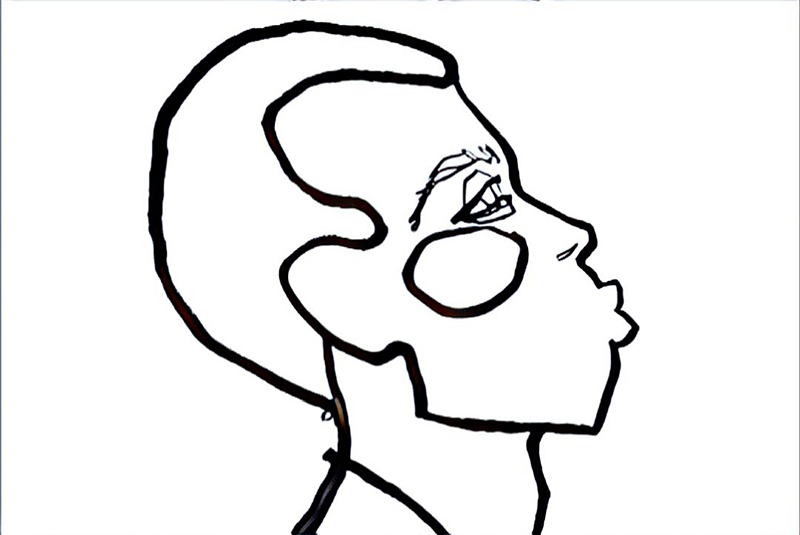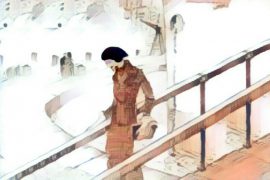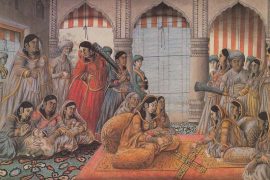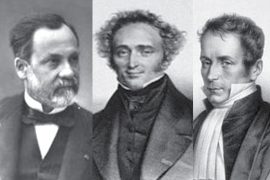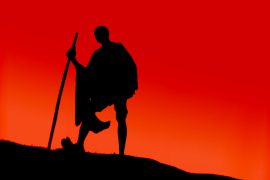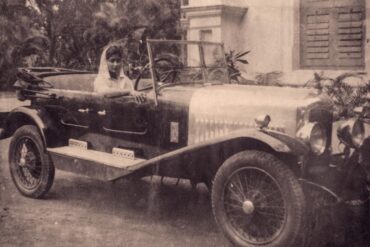Xerxes, the Persian King of Kings, mounts his throne on a promontory, from where he gazes down at the million and half of his armies assembled to launch a second invasion of Greece in less than a decade. The decision to go to war was the natural consequence of an ominous apparition, presumably the ghost of Darius, Xerxes’s father, defeated at Marathon and demanding revenge by appearing twice to Xerxes and once to his uncle and royal counsel Artabanus.
Before crossing the Hellespont, by turning “water into land”— lashing together 360 boats—Artabanus voices his apprehension of dangers and premonition of doom awaiting them in the European territory. For his pragmatic mind, the enemies are not just formidable Greeks but also wind, storms and lions that lurk around the Aegean traverse, dwindling supplies, starvation, and exhaustion, a war lost even before a single arrow is shot.
Xerxes listens patiently and encapsulates, at the end, in one of the defining verses that differentiates a fox from a hedgehog—polarity residing in human nature—which drives humans to think and act in predictable patterns. Xerxes reassures Artabanus:
If you were to take into account of everything…you would never do anything. It is better to have a brave heart and endure one-half of the terrors we dread than to ponder all the terrors and suffer nothing at all…Big things are won by big dangers.
This prophetic utterance of Xerxes in 480 B.C. found precise fulfilment in human drama in the succeeding millennia. A fortuitous rumination on this topic prompted a British philosopher, Isaiah Berlin, to write a short book on this phenomenon, aptly titled The Hedgehog and the Fox. Berlin’s famous essay, widely deliberated and critiqued in academics and arts alike, is epitomised as “The fox knows many things, but the hedgehog knows one big thing.”
Artabanus made a comprehensive risk analysis, foreseeing likely events, whereas Xerxes had only a straitjacket vision of conquest and extending his ruling title to the kingdoms of Europe. This distinction between pragmatism and impulsiveness in decision-making and worldview generally divides much of humanity into two camps: foxes and hedgehogs.
Herodotus, the illustrious Greek historian’s narrative of Xerxes and Artabanus, vindicates the latter’s reasoning. Though he conquered territories of Thrace, Macedonia, and Thessaly and burned the Acropolis, he faced stiff resistance at Thermopylae at the hands of august warriors and intrepid Greek fighters led by spartan Leonidas’ elite 300.
The Greek forces vanquished and slaughtered Xerxes’s army at the Bay of Salamis, and in Aeschylus’s “Persians”, a dishevelled Xerxes is portrayed as battered and bruised, limping back into his capital amidst the taunts and ridicule of his people. Artabanus respects the environment, but Xerxes is incorrigible on reshaping it to his peril.
Philip E. Tetlock, the American political psychologist and his team undertook one of the most extensive and rigorous surveys to ascertain the quality and accuracy of forecasting. Between 1988 and 2003, Tetlock and his team collected 27,451 political predictions from 284 experts representing myriad domains—from universities, governments, think tanks, media and NGOs to international agencies.
The research findings were later collated and published into a book, Expert Political Judgement: How Good It Is? How Can We Know? which remains a seminal work on the art and science of Psephology. The positive correlations between predictions and precision were determined mainly—not by ‘who’ the experts were and their domain expertise or by ‘what’ their beliefs and political persuasions were—by ‘how’ they thought and analysed information.
The style of reasoning was critical and inevitable for accuracy. The more the experts identified themselves or exhibited qualities of foxlike behaviour, the more their predictions resulted in uncanny perfection. Foxes relied heavily on information gathered from diverse sources, subjected every analysis to logic and reason and self-critical on the likely outcomes.
Hedgehogs, by contrast, believed in their entitlement to infallibility, less discursive than foxes, detested criticism, egotistical and noisy. The greater the number of parts employed to create a bigger whole—and a mind reconciled to the probability of failure and its subsequent self-correction—the better the outcomes.
The legendary American novelist, F. Scott Fitzgerald, has a prescription for first-rate intelligence, which he states as “the ability to hold two opposing ideas in the mind and still retaining the ability to function.” It is a clarion call to move away from the rigidity of obstinate mindset and inflexible centrality of vision to perceive the world in an all-encompassing and accommodating divergent view.
Literally, it means to develop a mind where opposites reside in tandem, rather than two opposing minds delivering two different conclusions and often ruining an enterprise. To navigate the arduous paths of life, one needs to be a fox and a hedgehog at the same time. A seamless synchronisation of long-term vision and short-term goals is what differentiates ‘success’ from ‘failure.’
This concept is best encapsulated in one of the most erudite and brilliant screenplays written in the world of movies, by Toni Kushner for the film Lincoln, directed by the mercurial Steven Spielberg. To accomplish his noblest vision of emancipation from slavery and to move the Thirteenth Amendment in the fractious House of Representatives, President Lincoln is characterised as indulging in malodorous practices of underhand dealings, lies, flattery, intimidations, and bribery. When Thaddeus Stevens, Lincoln’s colleague, confronts this duality of character, he retorts with an air of sarcasm:
[A] compass… [will] point you true north from where you are standing, but it’s got no advice about the swamps and deserts and chasms that you’ll encounter along the way. If in pursuit of your destination, you plunge ahead, heedless of obstacles, and achieve nothing more than to sink in a swamp… [then] what’s the use of knowing true north.
In the murky world of politics, where no one is a permanent friend or a permanent foe, Lincoln’s pontification gives the impression that ends justify means and, therefore, moral trepidation should be condoned. One shouldn’t linger on the opposites of outright good and irredeemably evil, but striking the Aristotelian “golden mean” in character and conduct is essential.
The Indian philosopher Chanakya, whose treatise on statecraft, Arthashstra, is extensively studied, affirms:
A person should not be too honest. The straight trees are cut first and honest people are screwed first.
In short, one must be a fox and a hedgehog simultaneously, in the true Machiavellian sense, to establish order and thwart anarchy in human affairs. In his magnum opus, The Prince, Machiavelli maintains that the easiest way such a mindset could be learned is by understanding the exploits of great men in history and imbibing their experience, distilling that wisdom into a workable blueprint to apply in one’s life and work. History can point to the true north.
For Xerxes, ambitions represent endless possibilities without any anchor on the limitations of the means. For Artabanus, the journey is the destination, where the focus is on maneuvering the dangers that lurk on the way.
The consummation of any grand strategy warrants a coherence of leadership and logic, leading into the future and managing the present tasks. A theory that doesn’t account for past learnings to develop a present strategic plan to achieve a future goal is doomed to failure.
And there isn’t a better and easier way to learn than from those who have trodden the challenging paths and emerged victorious or have failed. A vision has no significance if it is not married to reality—the limited means at one’s disposal.
Reality incontrovertibly forces one to adapt and modify the present plans to accommodate uncertainties in the lines of “known unknowns” and “unknown unknowns,” phrases popularised by Donald Rumsfeld, the former U.S. Secretary of Defense.
To be a fox and a hedgehog simultaneously, conceiving a grand vision, weighing in options and being mindful of vagaries is a deliberate choice that requires a slow response, measured, analytical and logical thought process.
In his seminal book, Thinking, Fast and Slow, Daniel Kahneman, the Nobel laureate psychologist, defines cognitive processes as System II thinking, which is in sharp contrast to System I, which is impulsive and spontaneous, fight or flee reactions to situations and events. Reactions and responses produce wildly varying outcomes.
Constant practice leads to performance and is the bedrock of expertise and skill. Leaders are not always born but made, especially in a fast-changing and dynamically evolving world.
Where there is uncertainty and unpredictability, foxes are better equipped for survival than hedgehogs, who might be better suited for static environments. But static environments don’t exist anymore in the contemporary VUCA world.
Therefore, anyone with a burning ambition for success should introspect his worldview and ideas in terms of animals, namely the fox, a hedgehog or both.
-30-
Copyright©Madras Courier, All Rights Reserved. You may share using our article tools. Please don't cut articles from madrascourier.com and redistribute by email, post to the web, mobile phone or social media.Please send in your feed back and comments to [email protected]

